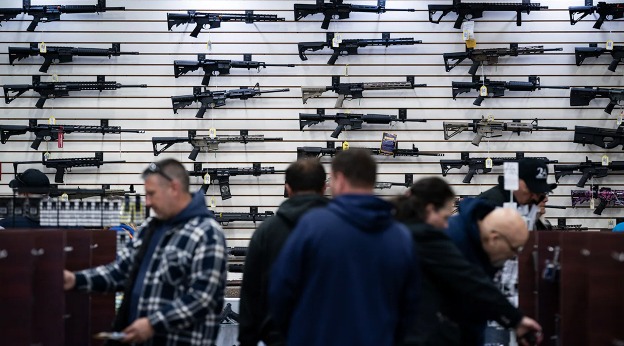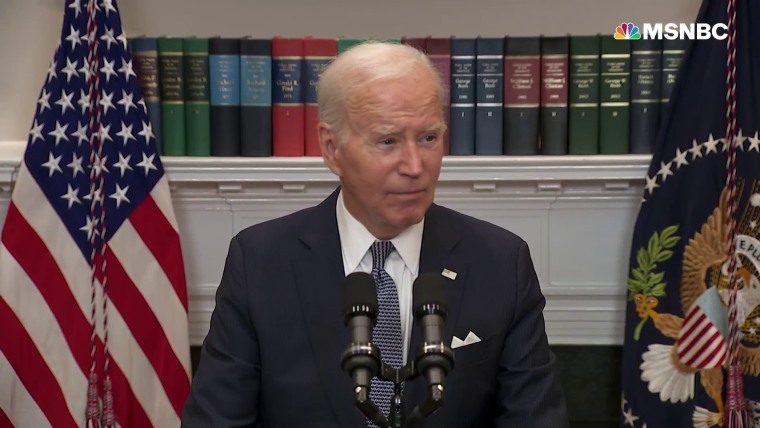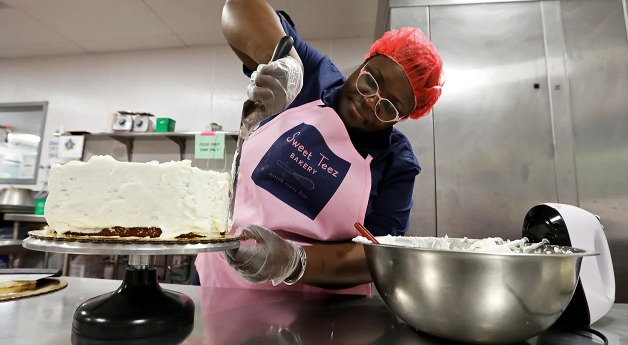Americans Anticipate Growing Gun Violence: A Grim Outlook
As total gun-related deaths reach distressing new heights, an increasing number of Americans view gun violence and violent crime as major and escalating national problems.
The Pew Research reveals that a staggering 62% of Americans believe that gun violence will increase over the next five years, while only 31% expect it to remain the same. Merely 7% believe it will decrease.
The Divided Views on Gun Ownership and Safety
The question of whether gun ownership enhances or diminishes safety divides the nation. Exactly 49% of Americans argue that gun ownership increases safety by empowering law-abiding citizens to protect themselves, while an equal proportion contends that it reduces safety by granting excessive access to firearms and exacerbating misuse.
Public Support for Stricter Gun Laws and Specific Proposals
A significant majority (58%) of Americans advocate for stricter gun laws, with only 15% favoring less stringent regulations. Support for stricter gun laws has risen since 2021 and stands at a similar level as in 2019.
There is overwhelming support for specific gun policy proposals as well. Preventing mentally ill individuals from purchasing guns garners the support of 88% of Americans, while increasing the minimum age for buying guns to 21 receives the backing of 79%.
Moreover, banning high-capacity magazines (66%) and assault-style weapons (64%) continues to enjoy majority support.
Sharp Partisan and Regional Divisions on Gun Ownership and Safety
Gun policy remains one of the most polarizing issues in American politics. Republicans and Democrats starkly differ in their views on the impact of gun ownership on public safety. While 79% of Republicans believe that gun ownership increases safety, an almost identical 78% of Democrats argue that it decreases safety.
Perceptions of gun ownership are also closely tied to geographic location. Those residing in rural areas are twice as likely as urban dwellers to believe that gun ownership enhances safety (65% vs. 34%). Gun owners themselves are nearly twice as likely as non-owners to hold this view (71% vs. 37%).
Gun Violence and Violent Crime as Major Concerns
Gun violence and violent crime are increasingly recognized as significant issues by Americans. Democrats are twice as likely as Republicans to view gun violence as a “very big” national problem (81% vs. 38%).
Over the past year, both parties have witnessed an 11 percentage point increase in those considering gun violence a major concern.
Similarly, the perception of violent crime as a major problem exhibits less partisan division. Growing proportions of both Republicans (64%) and Democrats (52%) now view violent crime as a significant issue.
Continued Support for Gun Policies
Various specific gun policy proposals maintain wide public support. A remarkable 88% of Americans favor preventing individuals with mental illnesses from purchasing guns, with 72% expressing strong support for this measure.
Notably, this is the only policy proposal that garners overwhelming bipartisan agreement, with 89% of Democrats and 88% of Republicans in favor.
While opinions on most gun policies have remained relatively stable in recent years, an increasing number of adults now endorse allowing teachers and school officials to carry guns in K-12 schools. Currently, 50% of adults support this, up from 43% two years ago.
The grim reality of growing gun violence and the divided views on gun ownership and safety are causing concern among Americans. With overwhelming support for stricter gun laws and specific policy proposals, the nation is grappling with finding solutions to address this escalating issue.
Majority Anticipates Worsening Crisis: Alarming Surge in Gun Violence
In recent years, the United States has been grappling with a growing crisis that has left communities devastated and families shattered. Gun violence, once considered an isolated issue, has now become an alarming epidemic that continues to plague the nation. With each passing day, the majority of Americans anticipate a worsening crisis, as the surge in gun violence shows no signs of abating.
The statistics surrounding gun violence in the United States are staggering. According to the Gun Violence Archive, there were over 43,000 incidents of gun violence in 2020 alone, resulting in more than 19,000 deaths and 23,000 injuries. These numbers represent a significant increase compared to previous years, and they paint a grim picture of the current state of affairs.
One of the most concerning aspects of this crisis is the indiscriminate nature of the violence. Shootings occur in schools, places of worship, shopping centers, and even in the safety of people’s homes. No one is immune to the threat of gun violence, and this reality has left many Americans living in fear and uncertainty.
The reasons behind this surge in gun violence are complex and multifaceted. Some argue that the easy accessibility of firearms plays a significant role in the crisis. The United States has one of the highest rates of gun ownership in the world, with an estimated 393 million firearms in civilian hands. This abundance of guns increases the likelihood of them falling into the wrong hands, whether through theft, illegal sales, or inadequate background checks.
Another contributing factor is the prevalence of mental health issues. Many perpetrators of gun violence have a history of mental illness, and the lack of accessible and affordable mental health services exacerbates the problem. Addressing mental health concerns and providing adequate support to those in need is crucial in preventing future acts of violence.
Furthermore, the ongoing debate surrounding gun control legislation has hindered progress in curbing gun violence. While some argue for stricter regulations and background checks, others advocate for the protection of Second Amendment rights. This polarizing issue has resulted in a stalemate, leaving communities vulnerable and unable to implement effective measures to prevent gun violence.
The consequences of this crisis extend far beyond the immediate victims and their families. The psychological impact on survivors, witnesses, and first responders cannot be underestimated. Communities are left traumatized, and the long-term effects on mental health and social cohesion are immeasurable.
To address this worsening crisis, a comprehensive approach is needed. It is imperative that lawmakers prioritize the safety and well-being of their constituents by enacting sensible gun control measures. Stricter background checks, closing loopholes in the system, and implementing red flag laws are just a few steps that can be taken to prevent firearms from falling into the wrong hands.
Additionally, investing in mental health services and providing accessible resources for those in need is crucial. Early intervention and support can help identify individuals at risk and provide them with the necessary assistance before they resort to violence.
Lastly, fostering a culture of responsible gun ownership is essential. Educating the public about safe storage practices, promoting responsible gun sales, and encouraging reporting of suspicious behavior can all contribute to reducing gun violence.
The majority of Americans are acutely aware of the worsening crisis of gun violence in the United States. It is high time that we come together as a nation to address this issue head-on. By implementing comprehensive measures, prioritizing mental health, and enacting sensible gun control legislation, we can hope to reverse the alarming surge in gun violence and create a safer future for all.









